#MPW language analysis
Text
The Importance of Amae in My Personal Weatherman
Masterlist || Language Analysis Part 1
I have seen a lot of discourse in the English-speaking fandom surrounding Segasaki's apparent dismissal or trivializing of Yoh's desire to pursue his manga, and most of it is negative. His comments about wanting Yoh to remain dependent on him, or that Yoh does not need to earn money are seen as patronizing or controlling at best and oppressive at worst. It appears that Segasaki does not understand nor respect Yoh's need for independence, and that is what strains their relationship.
But what if I asked you to consider that Segasaki's behaviour is actually an invitation to Yoh to reinforce their relationship? And what if I told you that Yoh's withdrawal from Segasaki constitutes a rejection of that invitation, and it is that rejection that strains their relationship instead?
Of course, the end result is the same - a strained relationship - and in reality there is never one side wholly responsible for this. The point of this is to simply challenge the cultural notion that a successful relationship is the coming together of two equally independent individuals, as opposed to the co-creation of a relationship formed by two interdependent individuals.
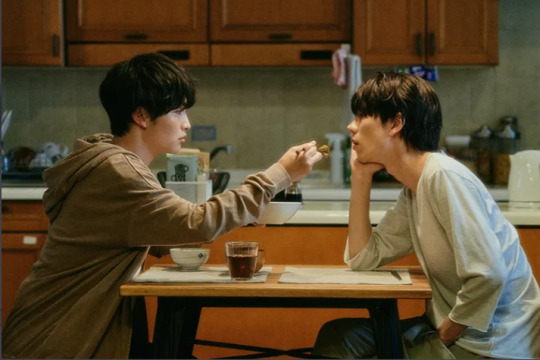
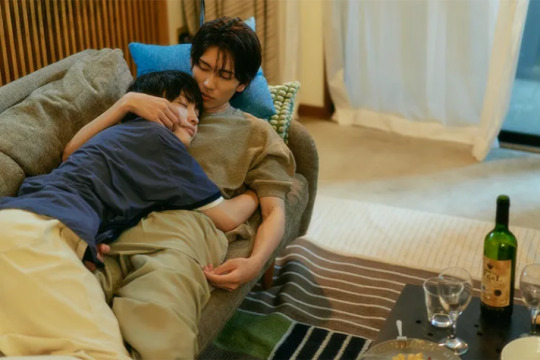
"If only you could stay drunk forever..."
"It's okay to feel down again for me too you know"
- Segasaki, Ep 4, Ep 5
This isn't about Segasaki wanting to keep Yoh is helpless and dependent on him, but about wanting Yoh to be able to be true to his feelings and express his own desire for affection honestly, without having to hide behind "I hate you" or rejection.
Or, let's try and talk about how Segasaki and Yoh reinforce their relationship through the use of amae (featuring a brief mention of tatemae/honne) who am I kidding this is not brief at all
First: Cultural Context
The way people conceptualize and make meaning of the Self differs between Western and East Asian cultures, and this plays into the differences we see in the basis for our self-esteem, the personal attributes that we value, and even what constitutes the behavior of a mature individual. Broadly speaking, Western cultures tend towards the Independent Self Construal (whereby the Self is a distinct entity separate from others) whereas East Asian cultures tend towards Interdependent Self-Construal (whereby the Self is connected to and defined by relationships with others). Thus, in the West, expressing one's individuality is very important for one's self-esteem, and being able to communicate clearly and confidently is valued and a sign of maturity. Conversely, in the East, one's ability to integrate and become a member of the group is prized, and contributes significantly to one's self esteem. In order to be seen as a mature individual, one must learn not only to read a social situation but also how to modify one's behavior in order to respond to the changing demands of that situation, with the ultimate goal being to maintain group harmony.
tl;dr - In East Asian culture, behaviors and attitudes that emphasize interdependence and promote group harmony actually play a big role in reinforcing relationships and one's membership towards the group.
Segasaki is an expert at this - his "public mode" that Yoh refers to actually shows us how good he is at social interactions. This is the Japanese concept of tatemae/honne (crudely translated as public self/private feelings) - which I could link to a bunch of articles for you, but I'm going to suggest you check out this 9 min street interview instead. At 6:41, one of the interviewees comments that another is sunao, or "honest" (we'll cover this later too) and at 6:49 specifically talks about how reading situations is important as an adult. Segasaki reads the room well, but most importantly, he reads Yoh well.
Yoh is not good at this, at all. In Ep 6, we see that he does not integrate well with the group, and he doesn't realize how he might appear to others when he stares and sketches from afar. Yoh does not read the room well because he doesn't pick up on social cues and does not adhere to social norms (I'll point these out in Ep 6's corrections). He cannot read Segasaki, and especially cannot read Segasaki's amae, or his attempts at reinforcing their relationship. Part of this is because his low self-esteem causes him to withdraw from Segasaki's affection as a means of self-protection, and so he valiantly tries to deny his feelings for Segasaki. As Man-san commented in Ep 4, Yoh is not sunao - he has difficulty with being true/honest about his feelings, even to himself.
Sunao is another term that usually pops up when talking about feelings/relationships. It can be used to describe one's relationship with oneself, as well as the relationship with another/group. With oneself, it is usually used to mean "being honest/truthful/straightforward/frank/open-minded about one's feelings". With another person/group, it is usually used to mean "to cooperate/listen/be obedient, or "to be humble/open-minded". In essence, the word encompasses an ideal virtue that is often taught from early childhood - that we should treat both ourselves and others with humility and honesty, because that is how we accept ourselves and stay in harmony with other. This is what becoming an adult, or gaining maturity, means (not gaining independence, as adulthood is often equated to in the West - do you see a running theme here 😂). Of course, that's actually really hard to do, so you'll often hear children (and immature adults too) chided for "not being sunao" (this can therefore sound patronizing if you're not careful). We'll revisit this in a little bit.
Second: What is Amae?
Amae is a key component in Japanese relationships, both intimate and non-intimate. It happens every day, in a variety of different interactions, between a variety of different people. But it is often seen as strange or weird, and those unfamiliar with the concept can feel uncomfortable with it. This stems from the difference in self-construal - because independence is tied so strongly to an individual's self-image in the West, it is very hard to fathom why behavior that emphasizes interdependence could be looked upon favorably. It is telling that every possible English translation of the word "amae" carries a negative connotation, when in Japanese it can be both negative or positive. The original subtitles translated it as "clingy", for example. Other common translations include "dependence", "to act like a child/infant", "to act helpless", "to act spoiled", "coquettish", "seeking indulgence", "being naive" etc.
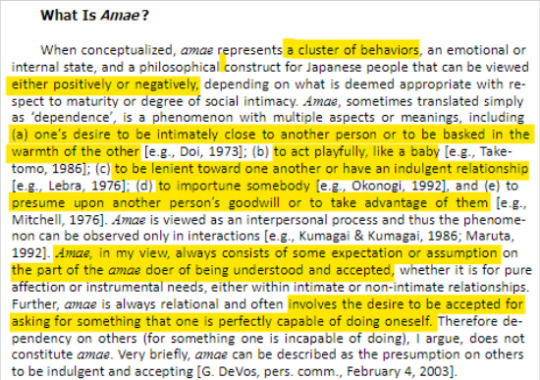
From A Multifaceted View of the Concept of Amae: Reconsidering the Indigenous Japanese Concept of Relatedness by Kazuko Y Behrens
*Note - the word "presumed" or "presumption" or "expectation" or "assumption" used in the above definition and in the rest of this post, can give the impression that all of amae is premeditated, which adds a calculative component to this concept. Whilst amae can indeed be used in a manipulative manner (benign or otherwise), it is not the case for every single situation, and often amae that seeks affection is often spontaneous and without thought, precisely because the situation allows for it to appear organically. This is the amae that Segasaki and Yoh most often exchange - so think of these assumptions and expectations as "unconscious/subconscious" thought processes.
Third: Amae Between Segasaki and Yoh
Yoh shows a lot of amae when he is drunk:


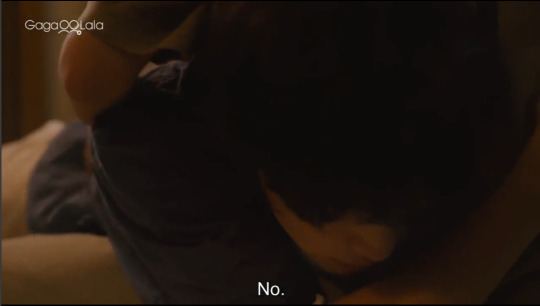
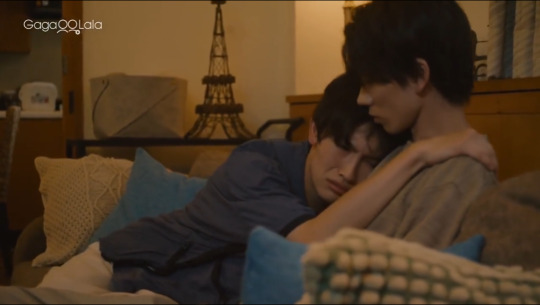
He whines, buries himself into Segasaki's embrace, refuses to move or let go of him, and keeps repeating "no". In these interactions, Yoh wants Segasaki's affection, but instead of asking, he does, well, this, and he presumes that Segasaki will indulge his behavior. Leaving to get some fresh air might not be as obvious - but it is a form of amae as well, because Man-san is his guest, not Segasaki's, and he shouldn't be leaving Segasaki to entertain her. The expectation that this is okay, and that neither of them will fault him for it, is what makes it amae.
Segasaki obviously enjoys indulging Yoh when Yoh does amae, because he recognises this as Yoh's request for affection from him. It's not that Segasaki enjoys Yoh in this drunk, helpless state; it's not even that Segasaki feels reassured by Yoh's requests for affection. Segasaki knows Yoh likes him, and recognizes that Yoh is struggling with those feelings. That Yoh is actually able to do amae to Segasaki is what delights him the most, because it is something that requires a lot of trust in Segasaki and a willingness to be vulnerable in front of him. This is how amae reinforces relationships - when a request for amae is granted, both the giver and the receiver experience pleasant feelings.
That said, an amae request can also be perceived negatively - if amae is excessive, or if the person responding feels they are obligated to do so. In Ep 5, Man-san chides Yoh for his amae - the fact that he expected to do well from the beginning, and became upset when he failed. He told her about his unemployment, presuming that she would comfort him, but alas.
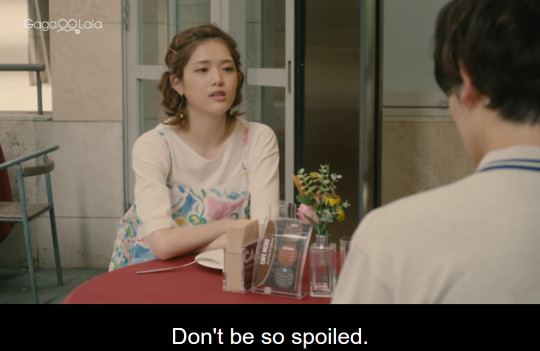
Segasaki also does amae - but unfortunately Yoh misses many of his cues, and so neither of them really gain pleasant feelings from the interaction (ok so maybe Segasaki does, but I will argue that is more because Segasaki also enjoys it when Yoh obeys him - see @lutawolf's posts for the D/s perspective on this!).
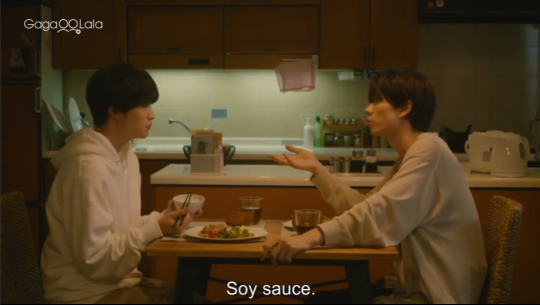


Did you catch it? Segasaki wants Yoh to pass him the Soy Sauce, which, clearly, he is capable of getting himself. He tells Yoh to feed him, because he wants Yoh's affection. And the real kicker - he asked for curry, and expected Yoh to know he wanted pork. In all these interactions, Segasaki presumes that Yoh will indulge him and do for him things he can do himself perfectly well (and even better at that) - this is what makes this amae. But look at Yoh's reactions:

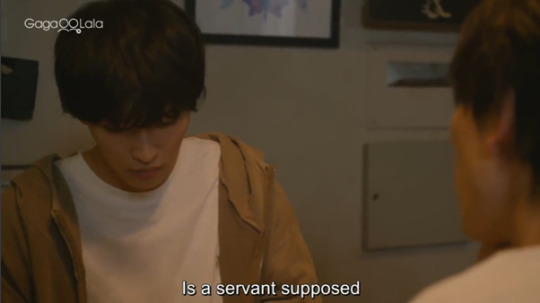
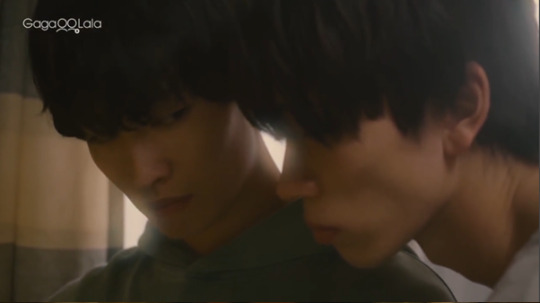
Yoh just stares between the Soy Sauce and Segasaki, between Segasaki and his food, and then just at Segasaki himself. He doesn't recognise any of this as amae, and in the case of feeding Segasaki makes the conclusion that this is somehow a new slave duty he's acquired. And therefore, he does not gain pleasant feelings from it.
In Ep 3 we see a turning point in Yoh's behaviour - his first (sober) attempt at amae (the argument in Ep 2 is debatable - it's not amae from Yoh's POV, but Segasaki responds as if it were, with a head pat and a "when you get drunk, you talk a lot don't you?").
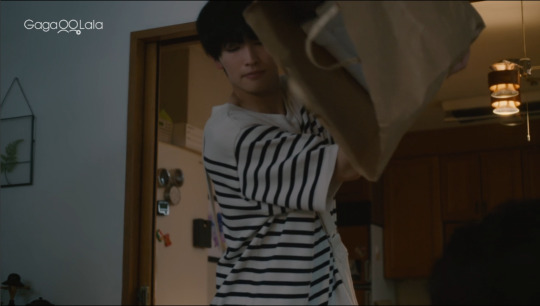
Here, Yoh wants to express his desire for Segasaki's affection, but he can't bring himself to say it aloud. Instead, he dumps bedsheets on Segasaki's lap, as if the bigger the scene he makes the greater the intensity of his desire he can convey. It is the presumption that Segasaki will understand him that makes this amae. And then, we get this:

Not only a happy Segasaki and a sweetly shy Yoh, but also a Yoh who's emboldened by Segasaki's response, and who finally, for the first time, reciprocates touch, and considers the possibility that Segasaki might actually like him.
With every episode, Yoh gets more and more comfortable with doing amae towards Segasaki, because Segasaki picks up on his cues and always responds to them. In Ep 5, Yoh's amae comes out naturally, triggered by the stress of his unemployment, and we see it in all those moments he sounds and acts like a child, and as I mentioned, Segasaki spends the whole episode reassuring Yoh that his amae is welcomed, and that Segasaki likes responding to it. If you've been wondering why the relationship between Segasaki and Yoh can, at times, feel somewhat parental in nature - this is it. It's because Segasaki sees the contradiction between Yoh's childlike insistence that he does not like Segasaki and his desire for Segasaki's attention and affection, for what it really is - Yoh's struggle with accepting himself. When Yoh is able to be sunao, he does amae naturally, and Segasaki responds to him in kind.
Now, all we need is for Yoh to recognize when Segasaki does amae, which will likely happen soon, given that Yoh has grown with every episode.
As always, thank you for reading :))
#my personal weatherman#taikan yohou#体感予報#segasaki x yoh#MPW language analysis#sociolinguistics#japanese language#japanese cultural tidbits#mytranslations#MPW subtitle corrections#my meta is creeping into my sub corrections#need to get it out here instead#sorry for the length#tbh posting such crazy long posts and expecting that people will actually read it#can be considered amae too 🤣🤣#Ep 6 corrections will be out next#I just needed to get this out before 7#and i sorta made it
433 notes
·
View notes
Text
MPW: Segasaki & Yoh - Language Analysis Part 1
Subtitle Corrections: EP 1 || EP 2 || EP 3
My Personal Weatherman is a story about the relationship between Segasaki and Yoh, so rather than being introduced to the characters, we the audience are dropped right into the middle of their relationship, and the only way we learn about the characters as individuals is through the way they interact with each other, and how that contrasts with how they interact with the people around them.
The show does an incredible job of keeping the portrayal of their relationship consistent across the use of character design, wardrobe, lighting, cinematography, acting choice, directorial choices and of course language use. But not everyone who watches has equal access to that last one, so I try to be as detailed as possible in my subtitle corrections posts. I'm also a bit of a language nerd. Now, I want to get into their actual relationship, because I think there is a lot of information about how they feel towards each other that's just getting missed. Also I love them and this is how I spazz.
This post is the first of four in which I hope to show how the dynamic between Segasaki and Yoh is reflected in the way they speak - specifically, in the way they address each other, and the style shifting, or speech level shifts that they both demonstrate with each other, using scenes from Ep 1 - 3. I'll be using my own translations for this, some of which differ from the Eng subs. (Please bear with the nerdiness - I don't want to assume how much people know about Japanese)

Prefacing this by saying that this language analysis is made specifically in the context of Segasaki and Yoh's relationship. There is a power imbalance here both in terms of social hierarchy (senpai/kouhai, age gap, successful/non-successful) as well as self-image (self-confident/self-conscious). Now, most of the time we see this manifested linguistically as the party with more social power using casual language forms, whilst the one with less power remains polite or formal. However, there is much more to human interaction than that, as we see in MPW where both Segasaki and Yoh shift in and out of Speech Styles often, depending on what they want to say and accomplish, as well as their emotional state.
1) Quick & Dirty Guide To Speech Styles/Formality Levels
Formality/Politeness is a spectrum and is expressed mostly through grammar and tone (sorry for the shitty word doc screencap):

1) desu/masu = formal/polite. Standard go to with the anyone you meet.
2) Generally speaking, the longer the sentence/the more syllables you hear, the more polite the sentence
3) The less direct you can be, the more polite you will sound
4) Word contractions (tsuzukereba -> tsuzukerya) = informal + impolite (but not always rude)
5) Slurred end vowels (iranai -> iranee) = informal + mostly rude, but not always (you just sound uncouth)
6) Most words have "formal", "informal" or even "rude" variations
7) CONTEXT DETERMINES EVERYTHING
Btw when I say "speaks roughly" or uses "rough speech", I mostly mean (4) + (5)
2) Speech Styles and Shifting Between Them
tl;dr
Japanese Speech Styles function like the verbal equivalent of personal space - the more formal/polite the level, the bigger the circle of personal space you maintain.
Shifts in speech styles indicate:
1) perceived changes in vertical and/or horizontal distance
2) the assumption of a position/role of the speaker in relation to the listener
3) changes in emotional state/the desire to convey emotion
4) the consideration of "polite company"
In this post we will look at examples of the first one - Vertical and Horizontal Distance.
Speech Styles: The Long Version (English Speaker POV)
Consider the way you speak if you were to say, give an important presentation in front of potential clients, versus the way you'd speak to an acquaintance you ran into on the street vs the way you'd speak to your closest friends. Different situations call for different ways of speaking - you're more likely to speak in full sentences and pronounce your words clearly for the first situation, and say "yes" instead of "yep" or "uh huh". You're also more likely to be blunt/direct with your friends than you are with clients - "You know ILU but do not under any circumstances buy that ugly ass shirt".
These context-dependent changes in speech patterns are similar to the changes in speech styles/formality levels in Japanese. Think of speech styles as the verbal equivalent of personal space. The more formal/polite the level, the bigger the circle of personal space you maintain. Dropping a level when you shouldn't is the verbal equivalent of invading someone's personal space and can make people uncomfortable and sometimes even angry. In Japan, the baseline "distance" with the average person is the way you would speak as if you were giving a presentation. Dropping to casual/informal speech might be tolerated (just like how you can tolerate someone sitting close to you and asking some questions, but it's uncomfortable), especially if you guys are around the same age, but dropping to "what's up bitcheees" when you should be at "hey how're you doing" basically tells the other person "I don't have even the basic level of respect for you".
In the same vein, the closer you are to someone, the more welcome you are in their personal space, and thus the lower the level of formality/politeness you'll keep with them. You trust that even if you speak bluntly, they'll understand you aren't trying to insult them. When and to what extent you drop a level is usually negotiated between individuals (either directly or indirectly). Once a level of casualness is established, your friends are going to look at you funny if you suddenly get all formal with them. They might even come ask if anything's wrong, or if you're angry at them or why you sound "cold". These shifts in speech levels therefore mark more than just the vertical distance between two people (ie, differences in social hierachy), they mark the horizontal distance (ie, how close people of the same "in-group" are to each other) too.
Having said that, there are times when you will shift to a more formal tone even with your friends or family - for example, when you're hosting a game at a large party and want to explain the game rules to everyone, you might enunciate your words better or keep the jokes to the minimum in order to convey the information is clearly and efficiently as possible. Similarly, if you've been appointed the leader in a group project and need people to pay attention and listen, you might change your tone of voice to command attention. In other words, when you assume a particular position, the way you speak changes too.
Finally, the way you speak to your friends/family in the presence of others (or "polite company", as they used to say) might also change - you might have no qualms cursing up a storm with your best buddy at the bar, but you might do your best to avoid being too vulgar when you're in front of their parents or your boss/university professor.
3) Segasaki and Yoh: Vertical & Horizontal Distance
Segasaki and Yoh are part of the same "in-group" in that they are in a relationship, so the horizontal distance between them is very small and before sunny days it's a negative distance - this is shown in how both Segasaki and Yoh use informal speech with each other (they generally omit the desu/masu forms aka use plain forms, and both use the informal pronoun "俺/ore" for "I" with each other).
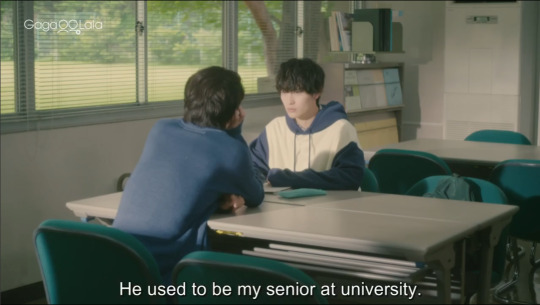
That said, there is also a hierarchy within that relationship (though their individual perceptions of that vertical distance differs) which stems not only from the nature of their living agreement, but also is likely to have carried over from their university days, when they shared a senior/junior relationship. Thus, generally speaking, Segasaki speaks quite roughly with Yoh whilst Yoh tends to use polite forms more often. Keep in mind however, that Japanese is a gendered language, and "rough speech" tends to be seen as a masculine speech pattern and can sometimes be normal between close male friends/family (otherwise, it is the verbal equivalent of getting up in someone's face and pushing them). The key here is that Yoh sticks to an informal, but more polite level than Segasaki does, and it is that difference that shows the power differential.
Horizontal Distance aka "We're Very Close"
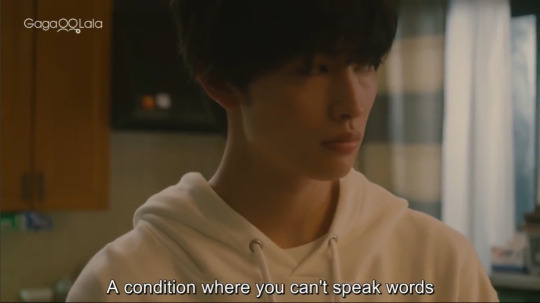
Despite Yoh's very valid complaint that Segasaki takes "man-of-few-words" to the next level (itself a liberty you'd only take with someone close to you), Segasaki only drops to rude forms in Ep 1 once:
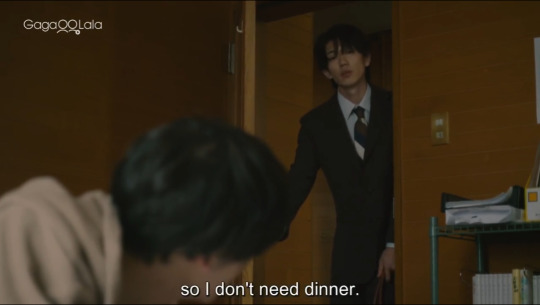
晩飯いらねぇ(banmeshi iranee) - slurred vowel
[literally - "dinner, not needed"]
Banmeshi is a more informal way of saying dinner (normal = yuu gohan).
Despite the slurred vowel, this sentence is not dismissive nor rude - it's what you'd expect between close friends/family.
In Ep 2 we hear Segasaki speak a lot more roughly to Yoh, as below, and of course during the almost-argument. But though his words are rough his intonation is often soft and he's quite tender with his touch. So, we can see that Segasaki isn't being disrespectful per se - he's not speaking roughly because he sees Yoh as beneath him in the social hierarchy - rather, he's demonstrating intimacy, familiarity and possessiveness, all at once. In fact, the more possessive he feels of Yoh, the more he drops his levels. As mentioned earlier, you only do this with people in your "in-group", with whom you know will understand you aren't insulting them.
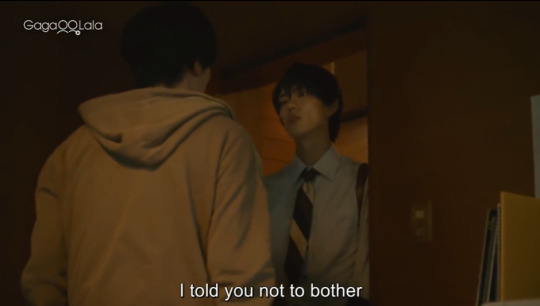
遅くなるからいらねぇっつっただろう
(osokunaru kara iranee ttsutta darou) - slurred vowel, word contraction, informal end particle
[I told you I wouldn't need it cause I'd be late right?]
Though somewhat in keeping with Segaski's curtness, this is still a pretty harsh sounding line - but note how Yoh doesn't seem offended or intimidated in the slightest - he understands that Segasaki is tired after a long day, and in return Segasaki softens his tone when he next asks "What did you make?"
Vertical Distance
It's easy to focus on Segasaki's use of rough, assertive langauge as an indicator of vertical distance, and I pointed out quite a few scenes in Ep 3 where he ends off what is essentially an order with assertive sentence-final particles. But focusing on this alone gives the mistaken impression that relationships with vertical distance go one way only - down - when in fact they are bidirectional. There is a mutual dependency between both parties, as we see clearly in MPW. Linguistically, this is portrayed through Yoh's choices to shift up a speech level.
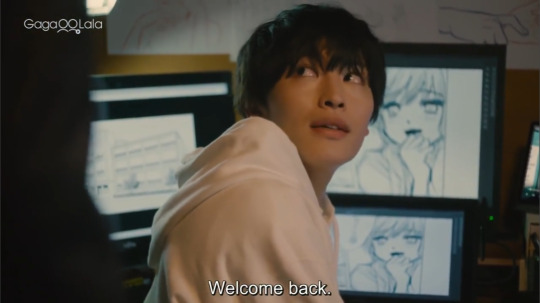
Just like how Segasaki is introduced to the audience through his proposal direct, informal and very forceful speech style, the first interaction we see Yoh have with Segasaki is a proper, standard greeting:
おかえりなさい
(okaerinasai)
[Welcome back]
Okaerinasai is the full, proper way to say this, but a more casual and common way to say this would simply be "okaeri".
See Ep 3 for discussion on standard greetings.
When Yoh thinks about Segasaki in his head, he often uses rough speech the same way Segasaki does, including the rude pronouns "aitsu/koitsu (that guy/this guy)", and yet when he speaks directly to Segasaki, he maintains an informal but still polite/neutral speech style. He rarely shifts down to rude forms, barely coming close even when drunk and emotional, but he does often switch up to a more polite level. In the above example, Yoh uses the full standard greeting in response to Segasaki's unspoken request:
俺、帰ってるんだけど
(ore, kaetterun dakedo)
[I've already come back, you know]
Ending with "dakedo" implies that speaker is going to follow up with something, usually a request or a question. In Japanese, this request/question is often left out, because the context given prior to "dakedo" is usually enough for the listener to fill in the gaps themselves. In this case, Segasaki might want a greeting or dinner, but at the very least, it's clear he wants Yoh's attention.
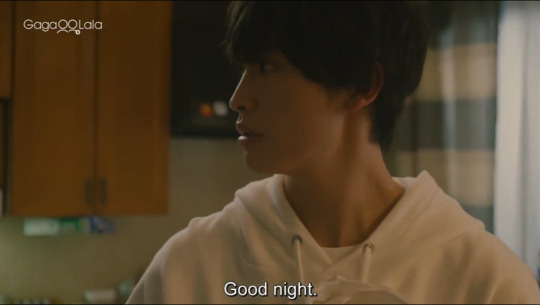
We know the standard greeting earlier was a style shift upwards because later in the episode, when Yoh says good night, he uses the casual version "oyasumi" instead of the full "oyasuminasai".
Even outside of standard phrases, Yoh's baseline is informal but not rude:
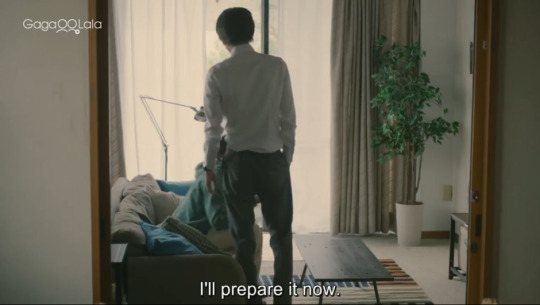
あ、いま準備する
(Ah, ima junbi suru) - plain form
[Ah, I'll prepare it now]
Probably the most telling is in Ep 3, when he's caught off guard whilst folding laundry.
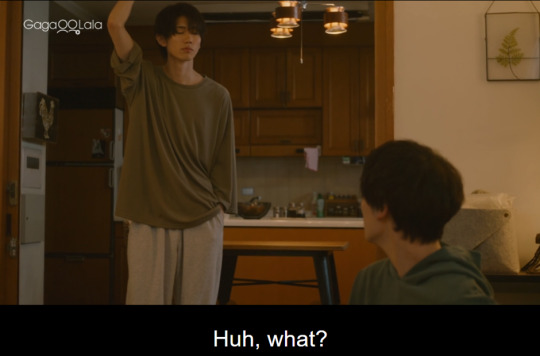
あ、なに?
(Ah, nani?) - plain form
[Oh! What?]
He answers Segasaki naturally, with just a word, as opposed to a proper “Hai/Yes?”, which he’s done sometimes when he’s unsure of himself, or if he's addressed directly.
So, we've established that Yoh’s baseline with Segasaki is informal but not rude - he feels comfortable enough with Segasaki to default to casual speech, but he acknowledges the power differential between them by simultaneously accepting Segasaki's rough speech as well as not dropping to it himself. This also tells us that the shifts up to formal/polite speech are deliberate and mean something. In EP 2, the shift demonstrated his insecurity surrounding his jealousy and their lack of physical affection, whereas in EP 3, he does it as a way to convey his gratitude.
In the next part, we'll look at how both Segasaki and Yoh use speech style shifts to convey emotion as well as to assume a particular position. Hope you enjoyed this!
#my personal weatherman#taikan yohou#体感予報#MPW language analysis#sociolinguistics#japanese language#mytranslations#MPW subtitle corrections#segasaki x yoh
152 notes
·
View notes
Text
MPW Language Analysis Part 2
Segasaki x Yoh: Shifts in Emotion and Acknowledging Roles
Masterlist || Language Analysis Part 1 || The Importance of Amae ||
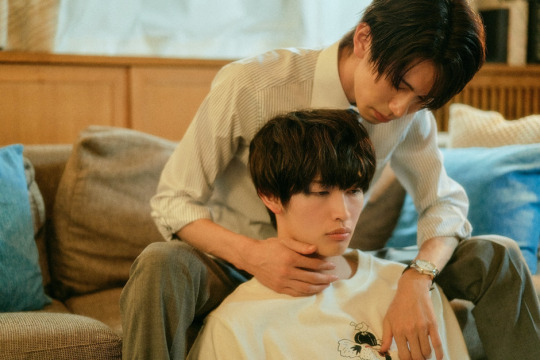
In Japanese, one cannot utter a sentence without communicating at least two things:
(1) the actual content of the message itself, the referential meaning; and
(2) a metamessage about the relationship between the speaker and the listener, an indexical meaning.
A striking feature about Japanese is that it is the latter message that most often assumes greater importance.
From: Creating an Ideal Self: Theories of Selfhood and Pedagogy at a Japanese Ethics Retreat by Dorinne K. Kondo
Every sentence that Segasaki and Yoh say to each other carries 2 meanings - the one we read in the subtitles, and too often, the one that never travels across the screen. The "miscommunication" that many perceive to be happening isn't always just about "using actions vs words" (though there is much to be said about that too) - the words are being used, but it's hard to hear them when said words are in Japanese and packed with information English is simply not designed to carry.
So, with 6 episodes of corrections made and nuances explained, it's finally time to get back to actually talking about how all of this adds to our understanding of the characters and of their relationship. In these 6 episodes, both Segasaki and Yoh have run the entire gamut of speech levels - but where Segasaki shifts consistently and with purpose, Yoh tends to shift as a reflexive, or reactionary response.
Or, what Segasaki choosing to shift up a speech level means to Yoh, and what Yoh's inconsistent shifts tells Segasaki (and us), about his emotional state. I'm kinda sorta not really sorry about this but ah, it's maybe possibly probably even longer than usual??
Quick Recap of Part 1:
We established two key aspects of their relationship:
1) They both acknowledge the power differential between them
- Segasaki, by using "rougher" speech patterns, and Yoh, by tending to stick to the more polite end of the scale.
2) They both consider themselves to be from the same "in-group"
- Both of them default to informal speech patterns when speaking to each other (even Yoh, despite being the junior/lower on the social hierarchy)
And now on to Part 2!
Changes in Emotion: Yoh
Yoh tends to experience his emotions rather intensely, and through his monologues we understand that he isn't always able to process these emotions immediately. As such, the shifts in his speech levels tend to happen subconsciously - there isn't an immediately obvious, predictable pattern to those shifts, because they are simply a reflection of how he's feeling in the moment.

Y: あ、いや。なんでもない…です*
Y: Ah, iya, nandemonai…desu*
Y: Ah, no, it's….nothing*
The shift to polite form, and the awkward manner in which he does it, reflects Yoh's growing insecurity (See EP 2 for other examples).
From the moment Segasaki starts returning home late, Yoh becomes more and more unsure of where he stands with Segasaki, and this growing emotional distance is conveyed through his speech patterns becoming (awkardly) more polite than in Ep 1. He speaks hesitantly and indirectly, until he gets drunk (and even then, his insecurity still shows in how he barely switches down to rough speech during their not-argument).
In Ep 3, we again see Yoh shifting up to polite forms often, except this time, the shifts show his gratitude as well as sincerity.

Because of how ridiculously expensive the pork bun is, Yoh expresses his thanks by saying the full ありがとうございます (arigatou gozaimasu) here as opposed to just "arigatou" or other more casual forms. In return, Segasaki acknowledges the formality Yoh pays him with a nod (and a mouthful of pork bun).
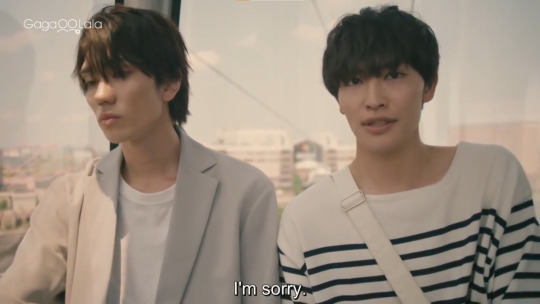
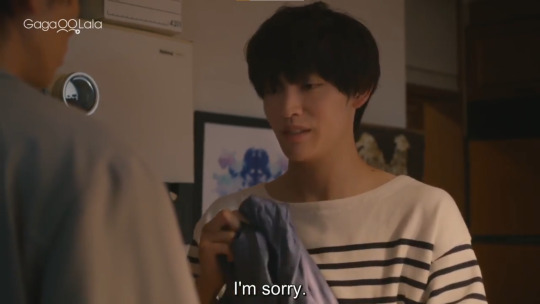
Y: すいません
Y: suimasen
Y: I'm sorry
This is the more formal version of "I'm sorry" (textbook pronunciation is sumimasen, but textbooks are for nerds Yoh's version is very common as well and still polite)
In both these scenes, Yoh switches to suimasen as opposed to his usual, and more casual, ごめん / ごめんなさい (gomen/gomen nasai), that he also uses in this episode. As previously mentioned, "sorry" in Japanese can also be used to mean "thank you". Here Yoh is doing both - apologizing for Segasaki having to "go the extra mile" to take care of him (ie, he feels he has imposed upon Segasaki - a fear he has mentioned a few times), and at the same time also expressing his gratitude for being taken care of. However, it's the shift up to the polite version that conveys his sincerity, and carries the extra message that - despite his regret at imposing on Segasaki - Yoh still values these moments and feels touched by them.
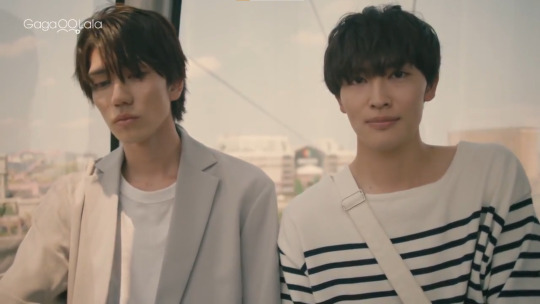
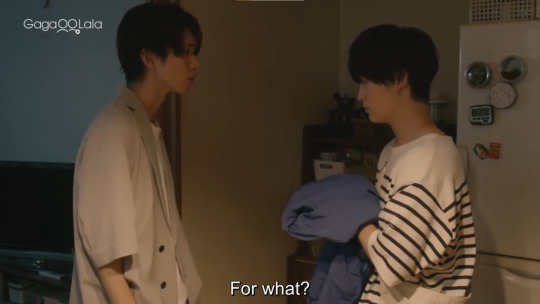
Both times, you see Segasaki taking note of this, albeit slightly confused, and probably a little shy too (Segasaki is after all, very good at picking up on social cues - especially Yoh's - and spends the whole of Ep 3 doing just that).

Y: 漫画が とてもだめです
Y: manga ga totemo dame desu
Y: (My) manga is... really bad.
Yoh spends most of Ep 5 safely ensconced in the informal speech level, switching up only twice - the above scene, and later when he attributes his recovery to Segasaki's care as a way of thanks. The switch in the bathroom is sudden, and adds a sense of certainty to his statement that reflects the intensity of the despair he feels (even though he comes across as more kicked puppy than anything). The formality is also a way to "distance" himself from the reality of it, because it does hurt to acknowledge this.
All of these instances show us that Yoh's shifts up in speech levels tend to reflect when he's feeling vulnerable in some way - when he's insecure, dejected or hurt, or when he feels that he has imposed upon Segasaki.
So then, does Yoh also shift down?

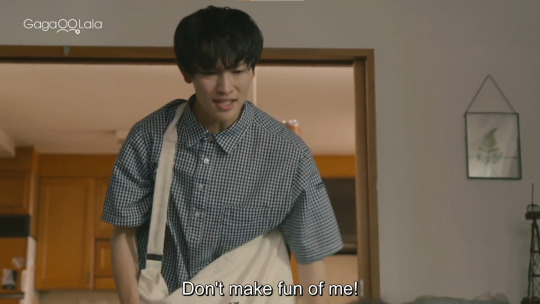
Well, yes and no.
Left (Ep 4):
Y: ふざけんな [very rude]
Y: Fuzakenna
Y: The hell are you doing!
Right (Ep 5):
Y: バカにすんなよ![slurred vowels]
Y: baka ni sun na yo
Y: Don't look down on me!
Even if we include (just barely) the non-argument of Ep 2, there honestly aren't many scenarios in which Yoh shifts down to a "rougher" speech pattern - and he never drops as low as Segasaki does. This has to do with both his acknowledgement of the power differential that exists between Segasaki and him, as well as his less assertive nature. In fact, even when speaking to Man-san, with whom he shares his thoughts more freely, Yoh remains casual, but not rough. (Man-san is waaaay rougher than Yoh, tbh). Hence, when Yoh does shift down, it tends to be explosive and short lived, just like his frustration or anger.
So why "yes and no"? Because being lower in the social hierarchy also introduces another, more interesting way to express yourself - by choosing not to switch up.
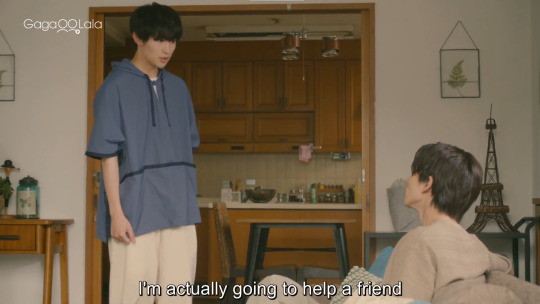

We see this in Ep 5, when Yoh tries to lie about going to Man-san's place. He sticks to his baseline informal speech when he announces this, whereas he previously used polite speech in Ep 4. Is it possible that Yoh was simply overcompensating and trying too hard to sound casual to hide his lie in Ep 5? Yes. But before coming to that conclusion, there is another important detail to note - that instances like this, where Yoh doesn't switch up, have gradually been increasing as the show progresses.
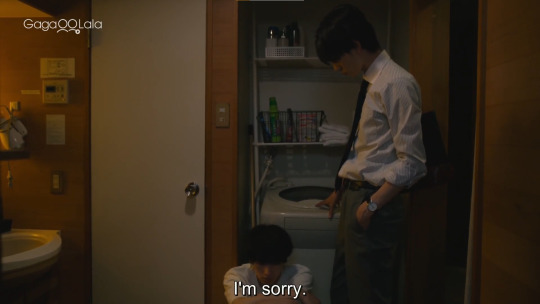

In Ep 5 and 6, Yoh uses the slightly less formal gomen nasai to apologize (contrast this with Ep 2's suimasen mentioned earlier). Given that Yoh himself mentions in Ep 5 that he thought Segasaki would be angry, and in Ep 6 clearly underscores his apology with a proper bow (yes, there are standards to how you should bow in Japan) - you would think that these 2 situations would be the perfect time to switch back up again. So why? Once again, the key to unlocking the metamessage is the wider context; i.e., we need to consider what Segasaki has been doing. please indulge my desire to sound cool and mysterious despite already announcing it in the title
Establishing Roles: Segasaki
In direct contrast to Yoh, Segasaki is very consistent with his speech shifts, and a clear pattern emerges. First off - when Segasaki is angry with Yoh, he drops straight down.
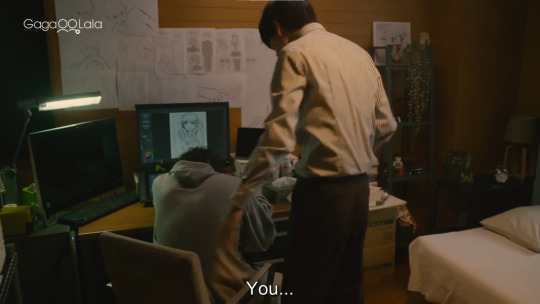
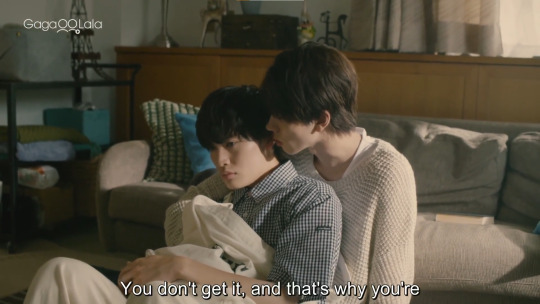
Left (Ep 2):
S: てめぇ [very, very rude]
S: temee
S: You
Right (Ep 5):
S: 分かってねぇだろ 分かってねぇから 泊りで仕事とか言い出すんだろうが [slurred Rs, word contraction, slurred vowels]
S: wakattenee daro wakattenee kara tomari de shigoto toka ii dasun darou ga
S: You don't do you? You don't understand and that's why you can just say things like you'll stay out to work overnight.
Like, waaaaaaaay down. The argument in Ep 5 is the most obvious example of this, but using "temee" to address someone like he does in Ep 2 is very very rude and, together with the "haaah?!" Segasaki says before this line, also does a lot to convey that he is Not Happy.
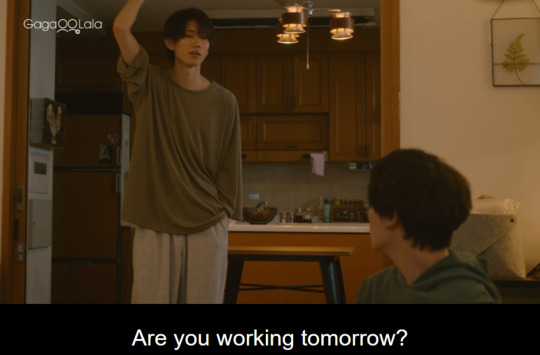
S: 明日は仕事すんのか [word contraction]
S: ashita wa shigoto sun no ka
S: すんのかしないのか、どっちだよ [word contraction, informal, assertive end particle]
S: sun no ka shinai no ka, docchi da yo
S: Are you working tomorrow?
S: Working or not, which is it?
The lines in this interaction from Ep 3 aren't really rude per se - certainly not compared to temee - but they are rougher than his usual and very direct. We've seen Segasaki do this multiple times throughout the episodes - dropping his levels when he's being assertive, and it is in response to that assertiveness, that Yoh gives the following reply:

Y: いや、ないです [plain forms, but with the addition of desu form]
Y: Iya, nai desu
Y: No, I don't [have anything planned]
Mixing plain forms with -desu at the end makes Yoh's reply a little more formal, and is another way in which Yoh acknowledges the power differential between them. Being higher in the social hierarchy means Segasaki enjoys a greater sense of linguistic freedom, and shifts down in speech level are therefore unsurprising, and indeed, expected.
So, if there is no real need for Segasaki to shift up, then, what does it mean when he chooses to do so?
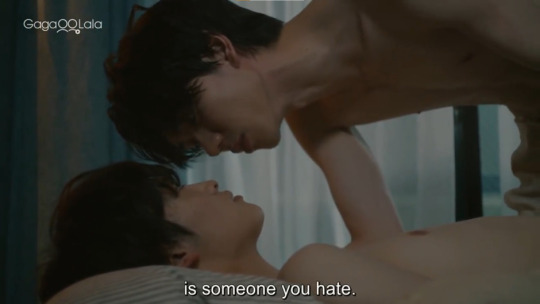

Left:
S: まあ 残念ながら 相手は大嫌いな俺ですけど
S: Maa... zennen nagara aite wa daikirai na ore desukedo
S: Well, unfortunately, your partner is me - who you hate so much
Right:
S: 好きにさせてもらうけど...な ?
S: suki ni sasete morau kedo... na?
S: I'll gratefully do as I please...yea?
After an entire episode of using Yoh's own words to tease him as a way to try and get Yoh to face his own feelings, Segasaki lands his sharpest and strongest push of the day in these 2 scenes not by reinforcing the hierarchy between them, but by subverting it. Shifting up to a more formal speech level when he doesn't have to, particularly in the second scene where he uses deferential word forms, creates the illusion of elevating Yoh in the hierarchy, which is then immediately undermined by the irreverent tone in which Segasaki says them.
In other words, Segasaki only shifts up as a power play.
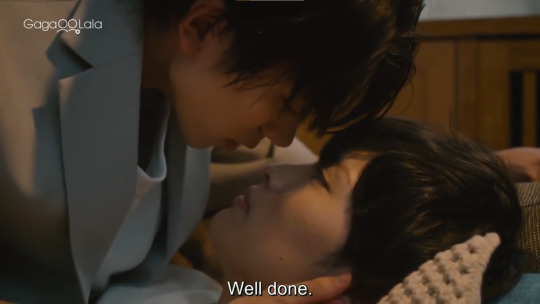

S: よくできました
S: yoku dekimashita
We first see Segasaki use this formal way of saying "well done" at the end of Ep 3 and again in Ep 4, and it brings to mind the literal stamp of approval that teachers often give to students in school. Here, there is no teasing or subversion of the hierarchy going on. Segasaki is establishing his role in Yoh's life - to provide and care for him - through the use of polite speech, and reinforcing the power differential between them in the most straightforward way possible.
This use of polite speech allows the speaker to indirectly index their social identity - often as one who is in charge or responsible. Within the Japanese household, it also happens when a role/obligation (often parental) is being carried out - eg , a parent might switch to polite speech to indicate their role as provider when asking the rest of the family "What would you like to eat?". Similarly, we again see Segasaki underscore his role in the following:

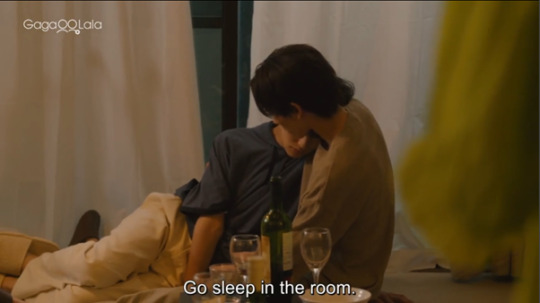
Left (Ep 5)
S: ごちそうさまでした
S: Gochisousama deshita
S: Thank you for the food
Right (Ep 4)
S: 寝るなら部屋いきな*
S: neru nara heya ikina
S: If you're going to sleep, then go to the room alright?
In Ep 5, Segasaki leads the saying of this standard phrase, customarily said at the end of a meal to express gratitude to everything that made the meal possible. It is the use of the full, more formal version (as opposed to just gochisousama) that indexes his role as Yoh's caregiver when he leads in saying this, and indeed he spends most of Ep 5 enjoying that role. In Ep 4, although he does not quite use the -masu form here, the imperative form "ikina" brings to mind a parent trying to coax their child to bed, the same way Segasaki is doing to a very drunk and sleepy Yoh.
This is the key we were looking for - with every episode, Segasaki consistently reinforces his role in Yoh's life, the same way he consistently responds to and encourages Yoh's amae. And with every episode, Yoh becomes a little more confident of his place with Segasaki, a little more willing to believe that maybe Segasaki might really return his feelings. It's easy to look at Yoh in Ep 2, see him push Segasaki away, and think that the same Yoh appears in Ep 5, but that couldn't be further from the truth. Because in Ep 2, a drunk Yoh barely drops to rough speech, whereas in Ep 5, a sober Yoh feels safe enough to even "curse" a little (well, as far as cursing goes in Japan at least, which admittedly is not far). In both word and action, they have both grown, and have both contributed to the strengthening of their relationship.
So! In conclusion (omg we made it to the end) we have established that:
Segasaki has a clear, predictable pattern in his shifts - he switches up to formal when establishing or reinforcing his role in Yoh's life, but when he's serious, or angry with Yoh, he drops all the way down.
Yoh is less consistent, because his shifts tend to be more subconscious and reflective of his emotional state. He's more inclined to switch up when he's in a vulnerable state, eg, feeling insecure or dejected, or when he wants to express his sincerity in apologizing or showing gratitude. When he's nervous, or in response to Segasaki either being direct with him or upset with him, he'll sort of switch up too (ie, he'll mix polite forms with informal forms, or he'll try to say things in an indirect way).
Through the use of speech level shifts, both Segasaki and Yoh indirectly reinforce and acknowledge their individual roles in each other's life, and by observing the changes in these shifts over time, we the audience are able to track the progression of their relationship as well.
In the next part, we'll look at the differences in the way they speak to others versus between themselves - looking specifically at examples from Ep 4, 6 and 7.
As always, thank you for reading, and feel free to ask any questions! (*ˊᗜˋ*)/
#my personal weatherman#taikan yohou#体感予報#segasaki x yoh#sociolinguistics#japanese language#MPW language analysis#mytranslations#MPW subtitle corrections#this post assumes you have read part 1 of the language analysis#who says MPW is over#it's not over i don't believe it#also this was so long#was it too confusing? should I be less nerdy?#ep 7's corrections will come out next#tumblr's formatting sucks but reddit sucks more lol#i still enjoy writing these posts though#i hope it gives everyone an excuse to rewatch MPW again
131 notes
·
View notes
Text
My Personal Weatherman Language Masterlist
[Last Updated 23rd Oct]
Disclaimer: Everyone translates differently for different audiences. This is not meant to disrespect the official translation team in any way because they are subbing for a more general audience and have different pressures, so please don't come at me or them for our different priorities. That said, I'm happy to discuss MY translation choices so please feel free to drop in about any line.
Subtitle Corrections
Including nuances + cultural tidbits
EP 1 || EP 2 || EP 3 || EP 4 || EP 5 || EP 6 || EP 7 || EP 8
Segasaki x Yoh - Language Analysis
Series looking at how the dynamic between Segasaki and Yoh is reflected in the way they speak - specifically, in the way they address each other, and the style shifting, or speech level shifts that they both demonstrate with each other.
Part 1
- What are Speech Levels & Why Shift?
- Segasaki x Yoh: Vertical & Horizontal Distance
aka power dynamics expressed linguistically
Part 2
- Segasaki x Yoh: Shifts in Emotion and Acknowledging Roles
aka reading between (spoken) lines
Part 3 [In Progress]
- Segasaki x Yoh: In the Presence of "Polite Company"
aka Segasaki's "face off" with Man-san
Part 4 [In Progress]
- Segasaki x Yoh: Addressing One Another
aka a look into the various ways to say "you"
Cultural Tidbits
The Importance of Amae in My Personal Weatherman
- Cultural Differences: Independent vs Interdependent Self-Construal
- What is Amae?
- (Briefly - what is sunao, tatemae/honne?)
MPW Timeline (Best Guess)
#my personal weatherman#masterlist#taikan yohou#体感予報#segasaki x yoh#japanese language#sociolinguistics#mytranslations#mpw subtitle corrections#mpw language analysis
140 notes
·
View notes
Text
My Personal Weatherman Ep 1 Subtitle Corrections
So I've been analysing the way MPW uses language to showcase the dynamic between Segasaki and Yoh - something that I suspect is not quite coming through with the English subs - and decided to watch Ep 1-3 again, with Eng subs this time. I am now going to complain about some of the subtitle and translation choices and edit them way too literally because I'm nerdy like that.
Disclaimer: Everyone translates differently for different audiences. This is not meant to disrespect the official translation team in any way because they are subbing for a more general audience and have different pressures, so don't come at me or them for our different priorities. I'm talking to the particular group of viewers who like this show and/or like Japanese and want to go a step further in interacting with the characters. That said, I'm happy to discuss MY translation choices so please feel free to drop in about any line.
Under cut because this GOT REALLY LONG.
I'm translating directly from the Jp, so sometimes my subs differ only slightly - I will lean towards a more literal translation here because that will allow me to explain my language analysis better in a follow up post so some phrasing may be awkward. Big changes/missing info have been italicised and bolded. Explanations of nuances/connotations have been added where I feel they add to the understanding of the character/scene, and the relevant phrase is marked with * in my translation and the Jp.
Ep 1

[S: だから、漫画つずけりゃいいじゃんって 衣食住の金は保証してやるから おれんとこに来い。んで、その代わり *俺の言うこと全部聞け]
Original: I said, just keep drawing manga. I’ll take care of your food and lodging *expenses, so come to my place. And in return, you’ll do everything I say.
Mine: I said, *it's fine (for you) to continue (being a) manga (artist). I'll take care of the expenses for your *food, clothing and lodging so, come (live) at my place. And, in exchange for that, (you must) *listen to everything I say.
*This whole paragraph is extremely blunt and direct. Every sentence is worded as an order, and this last line especially - the word "listen" is used here to mean "obey" - so this line really translates to, "in exchange for that, (I want you) to obey my every word". The reason it's not been translated this way is that it sounds so strong it borders on corny in English. In Jp though, the connotation of "obey" comes across not in the words but in the extremely strong/direct delivery of the line (contrasted with the extremely nonchalent tone), so it sounds more shocking/overbearing than it does corny. The original translation here works very well actually.
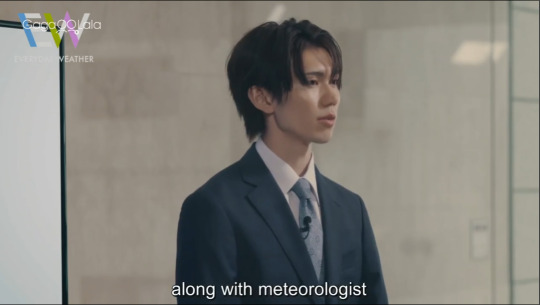
Technically Segasaki introduces himself here as 気象解説員 (weather forecaster) as opposed to 気象予報士 (meteorologist), but in the show's character bios, and when Man-san talks about him later, he's called a meteorologist anyway, so this difference is of absolutely no importance (I'm just anal like that). FYI, in Japan, all qualified meteorologists (who must pass a national exam) can be forecasters, but not all forecasters have this qualification.
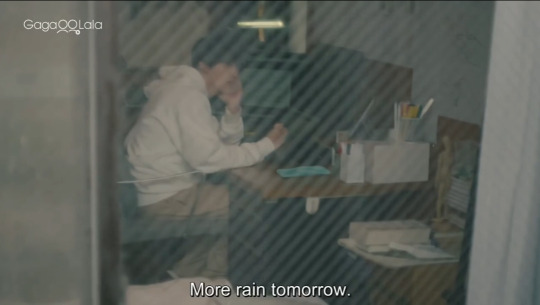
[Y: 明日も雨…か*]
Original: More rain tomorrow
Mine: There'll be rain again tomorrow, huh?
*Said with a falling tone, the "huh" here hints that Yoh is likely a little down/disappointed about the rain continuing, and lays the ground for his reaction later about the rainy season.

[M: 人を沼に召喚しといて 何なの?その態度
S: いや むしろ 万さんがかなり能動的に突っ込んできた印象しかないんだけど
M: ごちゃごちゃうるさい ややこしいオタクめ
S: ごめん ややこしくて]
Original:
M: Why summon someone into your otaku pit and act like that?
Y: No, it’s more like you actively intrude into my life
M: You’re being noisy and complicated, you complicated otaku
Y: Sorry for being complicated…
Mine:
M: (You’re the one who) dragged me into this fandom, (so) what’s with that attitude?
Y: No, on the contrary, I have the distinct impression that it was you, Man-san, who pretty much jumped right in of your own volition
M: (You’re) babbling nonsense (you) troublesome otaku
Y: Sorry for being troublesome

[S: めし なに?
Y: あ、しょーしょうがやき]
Original:
S: What do you want for dinner?
Y: Stir-fried ginger
Mine:
S: What's for dinner?
Y: Sho-shogayaki
Shogayaki is a style of cooking meat, usually pork, where you stir fry the meat with ginger. Unless the type of meat is specified, it refers to Pork Stir Fried with Ginger, or Ginger Pork Stir Fry. Very common home cooked dish.

[S: あ、そ] (A, so?)
S: Oh, is that so?
"I see" is a totally ok translation too. "A, so" can mean "Oh I see" or "Oh is that right" or "Oh is that so" etcetc but it has the air of a really bored "Oh, really?/Sure/If you say so" This is why Yoh's reaction after this is "if you aren't interested then don't ask!". This is the first of many times that Segasaki will use this phrase, as we will see in the following episodes, so I'm highlighting it here for now.
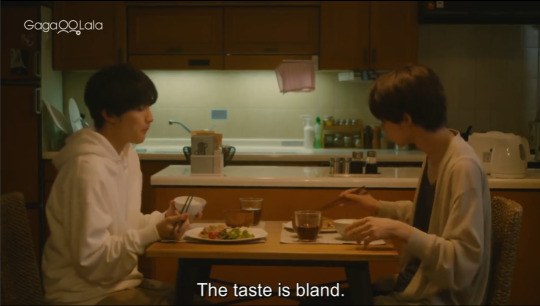
No translation issues here - but I just want to point out that it's reeaaally difficult to make tasteless shogayaki hahaha If you've had ginger stir fried in anything you'll know - it's not a meek herb at all. Canonically, Yoh is apparently a really bad cook. This will be pointed out again later, when he makes curry, because again, it's gotta be some kind of talent to make bland japanese curry; it's r*eeeeaally *easy. Anyway, the sauce that Segasaki asks for here is Soy Sauce, which is different from the sauce that he asks for later! Seems like a few people think they're the same thing (also pay attention to the sauce rack position here - Yoh'll will move it closer to himself by their next dinner hahaha)
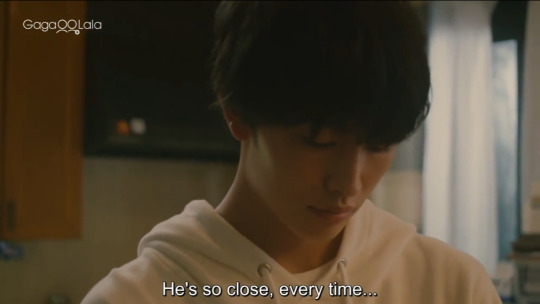
[Y: ちかいんだよ、いちいち*]
Y: He (leans in) so close, every (damn) time*!
*Not sure if this comes across, but the word for "every time" here is usually associated with slight annoyance, but the way "close" is said here implies Yoh's a little bashful about it.
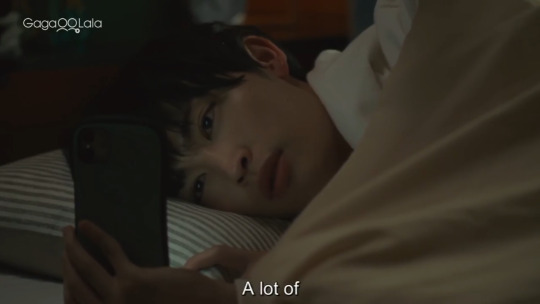
[Y: 雨、多いな*] (ame, ooi *na...)
Y: Rain...so much of it*
*This has the same feel as the "there'll be rain again tomorrow...huh" that we first saw earlier this episode. The ending particle "~na" bakes in a sigh and a sense of disappointment here (if you didn't notice the utter depression on Yoh's face lol)
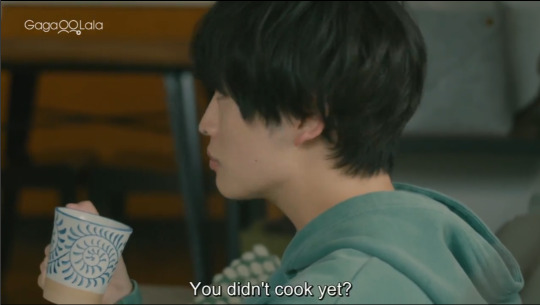
[S: めし、まだ?]
S: Food's not ready yet?
See, you don't notice it with the Eng translations because even the most basic Eng grammar will form a complete sentence. In Jp though, Segasaki is once again taking "man of a few words" to the extreme. He has taken out every single part of the sentence he possibly can whilst still keeping it grammatically complete. So this line is literally just "Food, not yet?". He's done this throughout the episode btw - it's why he comes across as so cold/distant.

[Y: やっぱ わかんねえよな]
Mine: As I thought, he doesn't understand...

[Y: 結局 従ってしまう自分の従順さが憎い*]
Original: I hate my obedience, always giving in
Mine: In the end, the obedient part of me that always ends up following his orders - I hate* it
*the word used for "hate" here is "nikui" which is different from the word Yoh uses when he says he "hates (dai kirai)" Segasaki. "dai kirai" is simply the opposite of "dai suki" - to really like, so is more accurately "really dislike" than it is "hate" (even though it is frequently translated as such). "Nikui", which is much stronger word, bringing to mind the idea of a "strong rejection of/detest/disgust for" something.

If you didn't already know, the word "embrace" aka "抱く" here is a euphemism for "to sleep with (somebody).
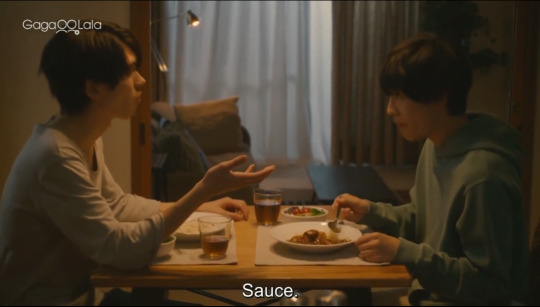
Shoyu = Soy Sauce. Sauce = worcestershire sauce, unless you're in a tonkatsu shop. Then sauce = tonkatsu sauce (which is a slightly different variation). Don't look at me, I don't make the rules.

(This is very long but I'm going to write the whole monologue here)
[Y: 晴れ予報の度に抱かれて
晴れ なんて単語は 暗いなかで湿っぽく行われる それとは ちぐはぐなイメージなのに。。。
まるでやらしい言葉みたいに 頭に刷り込まれていって
わかってんのか? あんたの口から 予報をきいて どんな気持ちになるか
わか���ないんだろうな 一生考えもしないだろうな
だってあんたは 恋人でもない俺に 平気でこんなことができる]
Original:
Every time there’s a sunny forecast, he does it with me
The word sunny
feels out of place for such activity
in a dark and damp room
It’s as if it’s such a lewd word being forced into my mind
Do you understand, how I feel when I hear that word from your mouth?
You probably won’t understand or even think about it for your entire life
You have no problem sleeping with someone you’re not even going out with
Mine:
(He) embraces (me) every time the forecast is sunny
A word like “sunny” … (brings up) a completely different image
from that damp, humid activity taking place in the dark
And yet (to me) it seems like a lewd, obscene word, searing (the image of) itself into my brain
Do you understand? How exactly I feel when I hear the forecast from your mouth?
You probably don't understand, do you? Probably won't ever think about it your entire life, right?
Because you're able to do this with me, (someone)who isn't even your lover, without any issues at all
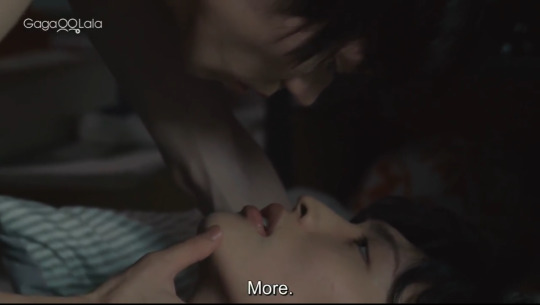
This line was ad-libbed btw, if you didn't already know (link leads to Kouhei's 16th Aug IG livestream, and his explanation starts around 07:20 mark) They've talked about this a few times on both their IG lives, and Kouhei seems to get prouder about it each time hahaha. In the linked IG, Kouhei said:
(reading a fan comment) "More" was an ad-lib?? I'm gonna die
Kouhei: Yea it was…ah that was…um, Mashiko-kun… Acchan (his nickname for Atsuki) gave me a really good expression so…somehow, (by the time) I realised (what I had done), yes, (by the time) I realised it,I had said it. Well probably saying "by the time I realised it" is weird but… yes. By the time I realised it... "even more"…(I'd wanted him) to open his mouth more so. Yes. That's all.
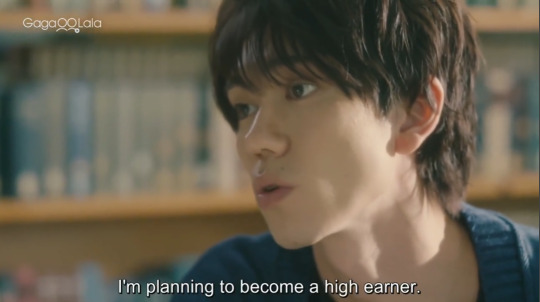
[S: そこそこ高給取りになる予定*だから]
Original: I'm planning to *become a high earner
Mine: It's likely* that I'm gonna be drawing a pretty decent salary so...
*The exact wording here is actually "(it has been) planned that (I will) become (someone) drawing a pretty decent salary so" - the way this is phrased indicates that this conversation probably happened in Segasaki's last year of university, probably right before he graduated when he already had a job lined up for himself. In Japan, your final year of university is spent interning at companies and if they like you, you'll stay on as a salaried worker, so most graduates will have something lined up before they officially leave university.

[Y: 流されるな]
Y: Don't get swept away (by this)
This phrase is usually used to warn people not to let themselves be swept away/caught up by the latest trends/public perception/societal expectations/their own emotions/panic etc Here, together with his insistence that he's just Segasaki's slave and so obeying him is a natural consequence, and so is sleeping with him (as opposed to Yoh doing it because he likes/wants to) - Yoh is basically telling himself "don't get swept away" by the situation/his feelings because their relationship doesn't mean anything.
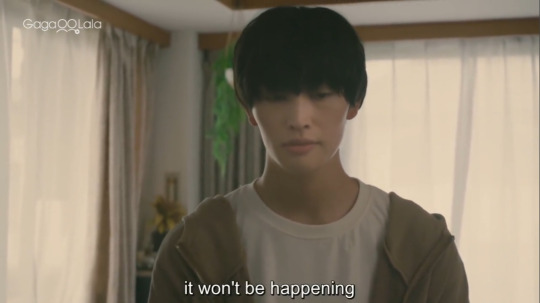

[Y: じゃあ、しばらく…ないのか。*slaps face*
しばらくしなくていいんだ!]
Original:
So, it won't be happening, for a while huh? *slaps face*
I'm fine without it for a while, right?
Mine:
So then... there won't be... for a while, huh... *slaps face*
(It should be) "I don't have to do it for a while!"
Again, you can see, Yoh's literally spent this entire episode trying to convince himself that he's not actually in love with Segasaki, and everything he does for Segasaki, be it listening to him, or sleeping with him etc, he does simply because he is fulfilling his end of the bargain as "a slave".
OMFG I FINISHED THAT WAS TOO DAMN LONG.
I will finish Ep 2 & 3 before I do the language analysis post. But first... I need a break....
#my personal weatherman#taikan yohou#体感予報#MPW subtitle corrections#mytranslations#this was not supposed to happen#i just wanted to nerd out at the way they talked to each other#not do subtitle corrections gdi why am i like this#i had to split the episodes because it was getting too long#translating is hard work i respect everyone ok#but also i get very frustrated when the subs are off#otherwise i just kinda sigh and lament about all the nuances people miss#this is why i don't like to watch with eng subs#left some out that weren't too important to the storyline because otherwise this post would never see the light of day#anyway hope this helps#also hope someone comes and geeks out with me
344 notes
·
View notes
Text
MPW Ep 2 Subtitle Corrections
Subtitle Corrections: Ep 1 here
Cultural/Language Tidbits: Ep 2 here
Same translation disclaimer applies. Thanks to everyone reading the first post and geeking out with me in the notes, I really appreciate it XD Ok, Ep 2, let's go! Sorry in advance for the length!
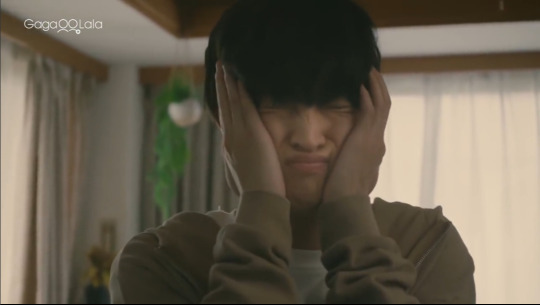
If you're wondering why Yoh's freaking out about the rainy season even though they've been together for 3 years, the manga artist posted a clarification on twitter:
By the way, “it’s been 3 years since then” – that phrase refers to it being 3 years since that conversation regarding the slave contract. As for living together, they’ve only just started (to do so) around Mar/April*, so (at this point) it’s only been a few months (for them).
What if (I) got it wrong…. I remember making a note of it, but the file that I wrote it in and passed over (to the crew) couldn’t be found right, so… (was it) a dream?”
*Japan's rainy season comes around June/July, so this means that this is the first rainy season these two have been experienced together.
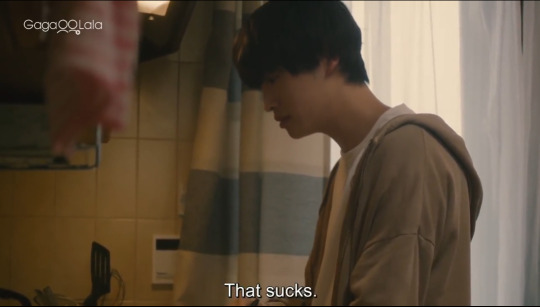
[Y: まずっ]
Y: Tastes bad
In case the original "that sucks" sounds like Yoh might be talking about the news of the young forecaster - he's really just talking about the food here.
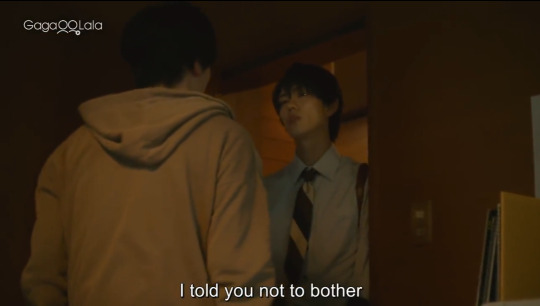
[S: 遅くなるからいらねぇっつっただろう]
Original: I told you not to bother since I returned late
Mine: I told you I wouldn't need it cause I'd be late right?
This is actually a pretty harsh sounding line tbh. It's sort of inkeeping with Segasaki's curtness, but still pretty harsh - so this tells us he's tired after a long day, and explains the frown on his face that Yoh just wipes away with his cuteness

Nikujaga literally means meat and potatoes. It's a stewed dish and a very well-loved comfort food. Super easy to make too (link goes to an easy to follow recipe, and the site also explains a little about the dish).
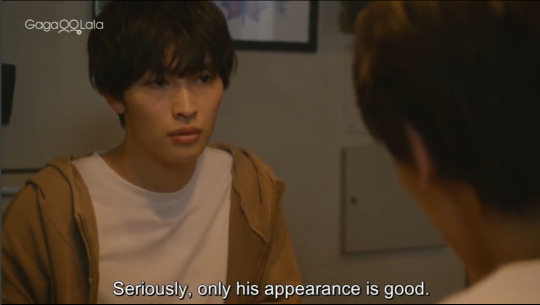
[Y: 本当、顔だけはいいよな]
Y: Really, it's only his face that looks good.

I've talked about this in my cultural/language tidbits for this episode (linked up top) but I'll add it here for completion's sake
[Y: あ、いや。なんでもない…です*]
(Ah, iya, nandemonai…desu*)
Y: Ah, no, it's….nothing*
Yoh let's his sentence trail off before tacking on a "desu" at the end. "Desu" is an ending verb characteristic of "polite" speech, which Yoh doesn't use frequently with Segasaki (in fact, by this point, he has not used polite speech with Segasaki at all, except for maybe saying the full form of the word "welcome home", and even that's pushing it). Here he adds it at the end as an afterthought (the polite form of "iya" would be "iie", if he had wanted the whole sentence to be polite from the get go), which tells us that Yoh's feeling a little off-kilter here, and does introduce the slightest distance between him and Segasaki. We'll see this distance increase as the episode goes on.

[Y: いや、どう考えても食べ過ぎだろう]
Y: No but, no matter which way you look at it, (he's) eaten way too much hasn't he?
Btw, if your hair started standing at the spoon scraping the pot - in the manga artist's post about visiting the shooting venue (as well as during Ep 1 twitter space) it was mentioned that Mashiko, the actor, can actually cook, so during filming they had to tell him what someone who can't would likely do, and also asked him to do the housework poorly (because Yoh's not supposed to be good at cooking or housework hahaha)
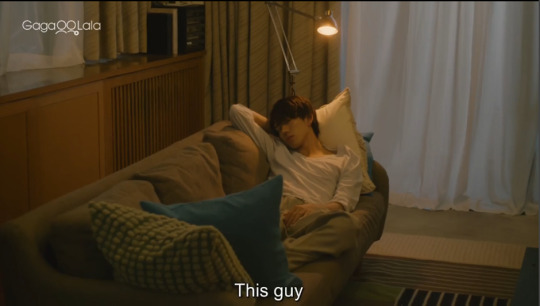
この人*、明日も朝早いんだよな。たぶん。
Original: This guy, has an early morning again tomorrow. Probably.
Mine: This person*, has (to leave) early tomorrow morning too. Probably.
*The word here is "kono hito", literally "this person". There's actually nothing wrong with the translation "this guy" tbh because that's a fairly neutral term in English, but I'm highlighting it here because in his monologues, Yoh usually refers to Segasaki using much rougher language, such as "koitsu, aitsu", except when he addresses Segasaki directly in his head. I'll talk more about how Yoh addresses Segasaki in the analysis post, but for now - this sentence hints that Yoh has clocked Segasaki's tiredness (subconsciously or not) and is feeling a little bad for him. Then again he quickly hides that by adding on "probably". (Adding the word "probably" behind your sentence is a common way to express doubt/negate what you just said, and incidentally is commonly used by comedians to deliver a punchline).
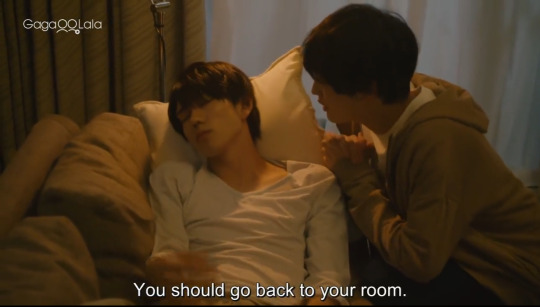
[Y: あの*…あの…寝るなら部屋でとおもって。]
Original: Um… Hey… You should go back to your room.
Mine:
Um*... Um... if you're going to sleep then, (it would be better to sleep) in your room - at least that's what I thought...
*"あの…" (ano…), translated as "um" here, is a common sound you use when you want to get someone's attention but don't want to sound too demanding - it actually isn't being polite per se, but it does show the hesitancy with which Yoh approaches him. Contrast this with the way Segasaki gets Yoh's attention (so far it's just been "Yoh" or "Oi" - the latter of which you would NOT use unless you were close to the person, or looking for a fight).
As a general rule of thumb, the level of politeness in Japanese is directly correlated with the length of the sentence and just how far you can beat around the bush. So, Yoh's suggestion that Segasaki goes to sleep in his room is literally just "if sleeping, then room..." and everything else in that translation is assumed. He may not being using polite speech forms here (that would be "to omoimashita" instead of "to omotte") but this is still a common way to be polite because he's making a suggestion that is so mild Segasaki can choose to ignore it. This is a great example of Brown & Levinson's "negative politeness" which we'll revisit when analysing their speech patterns, and which you can read about in entirely too much detail here (free to read).
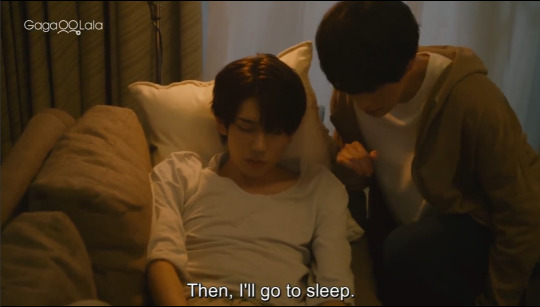
[Y: じゅあ、俺は寝るので**
あの、その、そういうことで、おやすみ]
Original:
Then, I’ll go to sleep.
That…sort of thing. Good night.
Mine:
So then, I'm going to bed, therefore**...
Um... that... with that... night!
"Therefore" is an awkward translation for the word ので (node), which is more often translated as "so". I've chosen to use that word because "node", whilst again not a polite form per se, is less colloquial than the more commonly used "から(kara)", to mean the same thing. It tends to pop up more in writing than in speech. "Therefore" doesn't make a sentence polite/formal in English, but it's definitely less colloquial than using the word "so". The use of "node" is just that tiny bit out of place in this sentence paired with the informal pronoun "ore" for "I" as opposed to the more formal choice of "boku".

Again, Yoh answers Segasaki properly here with a "はい (hai)" as opposed to his usual "un" (which is a sound that expresses agreement), when told that Segasaki will be late again. There actually aren't very many moments where Yoh does speak politely to Segasaki (he's definitely rude when he talks about Segasaki in his head hahaha), so these moments stand out. This whole short exchange, together with the random -desu he added earlier, just make Yoh's sentences a little more stilted/awkward, and more distant. Individually they don't deserve much mention at all, but together, and in the context of his jealousy, show just how unsure Yoh is about where he stands with Segasaki.
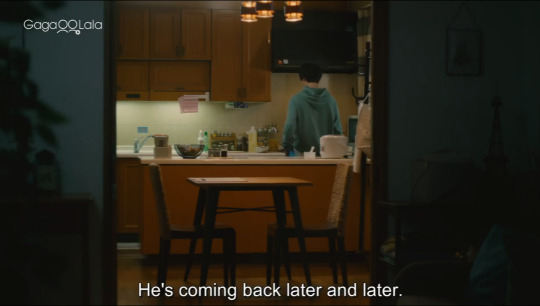
[Y: あの人の帰宅が遅くなり]
Y: That person returned home later and later
"That person" - similar to the above usage of "this person". This sentence is incomplete - the verb form of the last word - 遅くなり (osokunari) indicates that there should be a second part to the sentence (the "completed" form would be osokunatta). But after he says this, there is a pregnant pause, as Yoh puts his phone down and continues cooking alone. The pause continues all the way into the next scene, before the sentence continues, highlighting the loneliness that Yoh feels.

[Y: 当然、触れられることもないままに]
Original: Of course, he did not touch me at all
Mine: (and) of course, (I) remained untouched (by him) as well
The literal translation for this would be "(the situation in which I) was not touched (by him) continued on as well". Yoh uses the passive form of the word "touch", which places the emphasis on Yoh "receiving" the action of being touched as opposed to placing the emphasis on Segasaki "carrying out" the action of touching Yoh. Consider the difference between the sentences "I was hurt by him" and "he hurt me". The former is the passive form, and is super common in Jp, much less common in Eng. If this is confusing - welcome to Jp grammar just know that the emphasis of this line is more on what Yoh does not have, rather than what Segasaki has not done. It accentuates Yoh's feelings of emptiness and loss.
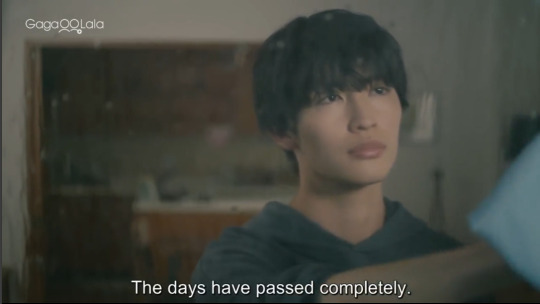
Y: すっかり日々は過ぎて
Y: The days pass by completely ...
Similarly, this sentence is "incomplete", and is instead continued by Segasaki walking in and telling Yoh he'll be late again. (This whole bit just hurts my soul tbh, Yoh is so lonely. )
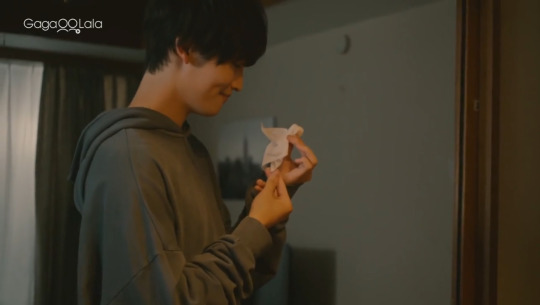
This is a teruteru bouzu aka a charm of sorts for good weather. See the cultural tidbits post for Ep 2 linked up top for more info!

This is said really strongly, and gives the "what the hell are you doing" feel. Yoh's truly upset here.

I try not to care about some of the subs in these side conversations because they don't add much to the main story and these posts are already too long, but this sentence should really be "Dammit, maybe I should (go) troll the chat" (and the previous sentence should be "If this was broadcasted in a certain country it would be instant death" aka N.Korea ^^;) and I just think it was a nice touch to hint at the fandom wars/flaming that goes on between fans hahaha
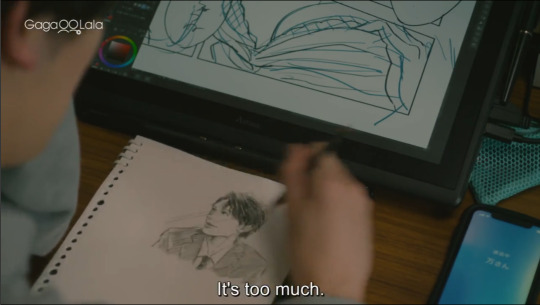
[Y: しんどい]
Y: This is too draining
The word here used is "shindoi", which is a term used when you're feeling mentally/physically exhausted/drained, and carries a sense of frustration (at feeling this way) and sometimes (emotional) pain.
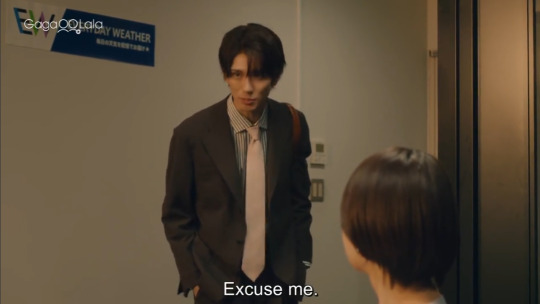
This. Is. Huge.
Segasaki does 2 things here - one, he rejects an after-work meal, which you rarely do because Japan is all about the group and rejecting a group invite, to welcome a new member, can make you seem like you aren't a team player - two, the guy who invites him is his senior, which you can tell because Segasaki sticks to polite speech forms whilst the other guy does not. It's still relatively casual, so you can tell he's got a good working relationship with them (probably why he's not worried about rejecting them) but still. In Segasaki's world, Yoh is the No. 1 priority.
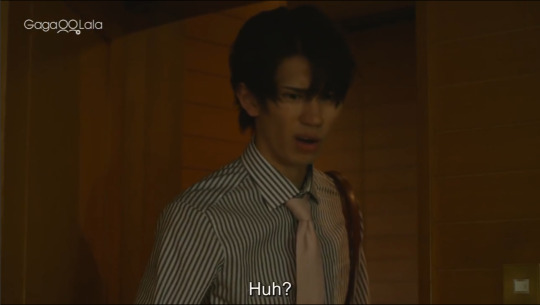
This is more accurately "WTF". There are many sounds in Japanese that aren't exactly words, but carry a lot of meaning - "Haa?!" is one of them, and is a very rude way to express a lot of anger and shock. Please, never say this in real life. You will royally piss off whoever it's directed at and if you are outside a Shibuya bar you will get punched.
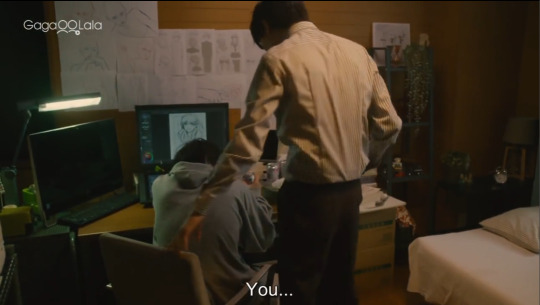
The word used here is てめぇ (temee), which is a really rude way to say "you", and has the same energy as "you bastard". Segasaki usually uses the informal pronoun "omae" for "you" when he talks to Yoh, he's definitely pissed off here.

This is the same word, "shindoi" again.
I'm going to put the rest of the whole argument here with just my translation because it's too long to screencap the whole thing.
[S: 何なんだよ?このエロい惨状は
Y: うるさい。
Y: 俺は売れっ子エロ漫画家になるんだ
S: なんだそりゃ。おい *takes away beer can*
Y: 売れっ子さんが シコリながらネーム描くと いいのができるって言ってた
S: なんも描けてなかったぞ。
S: おい、だめだっつってんの
S: 飲みすぎ 出すもん出して 寝てただけだろう
Y: 黙れ!
Y: 俺はエロくて 抜ける漫画描いて いっぱい稼いで
Y: 早く こんなとこ出ていくんだ
S: はあ? おい、お前 どういうつもりだよ
Y: どうもこうもないよ!
Y: 平気で抱かれてると思うなよ 。
Y: 俺のこと、好きでもないくせに
Y: 便利な奴隷としか思ってないんだろう?そんなにやりたきゃ隣のキャスターとやってろよ
S: お前 さっきから 何を...
Y: 俺はあんな風に笑いかけられたことない]
Breakdown:
S: What's up with this? This lewd disaster of a scene
Y: (You're) annoying!
["うるさい (urusai)" is often translated as "shut up", but it literally means someone is being "noisy", and here is more of a complaint that Segasaki is being bothersome]
Y: I'm going to become a hot-selling erotica manga artist!
[the word used here is 売れっ子 (urekko), which literally means "someone who gets huge sales" and mostly refers to idols, entertainers, TV personalities etc. So Yoh is not just saying he's going to become popular, he's saying he's gonna be like a celebrity manga artist, which is why Segasaki snorts a little at this]
S: What's with that? Hey. *takes away beer can*
Y: The hot sellers say that if you jerk off whilst drawing your storyboard, you'll come up with good stuff
[urekko-san is a pretty cute way of referring to these popular artists]
S: You've not drawn anything, you know? [this is said with a really indulgent air, which contrasts directly with the more authoritative tone of the next line]
S: Hey, I'm telling you no more *grabs beer can*
S: You drank too much. You just shot what you shot and then went to sleep didn't you?
[And this is back to an indulgent tone - also, everyone knows Segasaki is talking about cumming here, he just doesn't actually say it so directly]
Y: Shut up! ["黙れ (damare) - contrast with "urusai" earlier. The former is used much less commonly and really does mean to "be quiet". This is why Segasaki pauses and looks at Yoh. Up until now Segasaki just thinks Yoh's gotten drunk and is whining cutely, but this word means things are serious.]
Y: I'm going to draw manga that is erotic, that you can wank off to, and then earn lots of money [this is a call back to the conversation with Man-san over the phone in Ep 1, which I did not include earlier because I didn't think it was important to the story when Yoh says "the work that was released last month was amazing! There was a big buzz around the topic "I can't wank off (to this)" - Yoh was being sarcastic here, meaning that he got reviews that his work wasn't erotic enough]
Y: and leave this sort of place soon!
S: What? Hey - what (the hell) are you thinking? [Again, "haa?" here shows he does NOT like what Yoh's saying, but he does soften the end of the sentence with a "yo"]
Y: I'm not thinking of anything!
Y: Embracing me so easily - don't think you can (keep on) doing that [again, this is the passive form, so the emphasis is on Yoh being embraced, and here has the nuance of "don't think I'll just (keep on) being fine with being embraced (by you) like it's some sort of norm"]
Y: when you don't even like me [this line has quite a bit of bitterness in it - the emphasis here is strongly on Segasaki and his apparent "non-liking" of Yoh my english is dying.]
Y: You think of me as just a convenient slave, don't you?
Y: If you want to do it that much, go do it with that forecaster next to you!
S: You... from the start... what have (you been saying?)
Y: I have never been smiled at like that before [again, this is in passive voice]
It's obvious from the acting alone that this entire argument is pretty emotionally charged - this is also reflected in the language because Yoh uses the pronoun "ore (I)" a lot. Pronouns are frequently dropped in Japanese - often you can go an entire conversation without ever uttering the words "I/me" or "you", in part because the pronouns are assumed and also because emphasis on an individual can come across as too selfish/narcissistic or direct. Segasaki uses them often enough with Yoh, which fits his personality, but Yoh normally doesn't. So, when he uses "ore" here it stands out - his plans to be successful and leave, his feelings, his interpretation of Segasaki's actions - all of the emphasis is on his own self. The message is very clear - Yoh is hurting a lot more than he is blaming or accusing Segasaki.
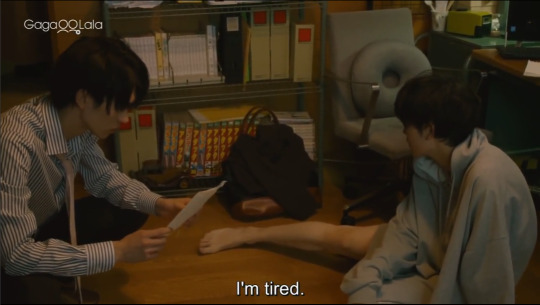
[Y: もう疲れた。あんたといると疲れる。嫌いだ
S: お前 酒入るとめちゃくちゃしゃべるんだな
Y: ねぇ、何で雨の時はだめなの?
S: はあ? だって、お前が言ったんだろう]
Y: (I'm) tired out. When (I'm) with you, (I) get tired. Hate it.
[We've lost the "I" pronouns here, because the emphasis is on the extreme sense of physical and emotional fatigue as opposed to Yoh himself, and on how much he dislikes that feeling. Of note, "hate" here is closer to "detest/really dislike" - the word is "kirai" - which is not as strong as the word "nikui" which we talked about in Ep 1 when Yoh said he hated the part of him that always listened to Segasaki. Also, this is the first time Yoh has addressed Segasaki with the pronoun "you" out loud - he uses "あんた anta", which he also used in his head in Ep 1, after they did it. Again, we'll talk about this in the analysis post in the future, but for now just know that this term is usually used between older couples.]
S: You... once you start drinking you really start talking huh? [literally, you "become able to talk"]
Y: Hey...why is it when it rains, (we) can't do it?
S: What? Because, you said so didn't you? [the last "haa?" from Segasaki! This time expressing his surprise and slight indignation.]
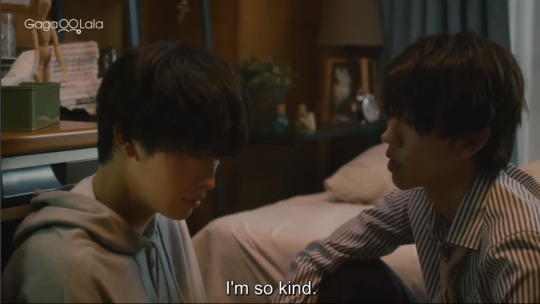
[S: 俺は優しいんだ]
S: I. am. Kind.
Great example of Segasaki's use of the "ore" pronoun here to quite literally emphasise how great he is. "優しい (kind)" in Japanese carries the connotation of being thoughtful, anticipating the other person's needs and wants and then meeting them etc. It's a characteristic that people often say they look for in their potential partners.
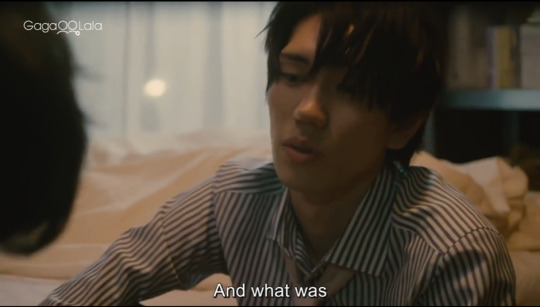
[S: そもそも、なんだ先の言いぐさは
好きじゃないだの 出ていきたいだの
お前 俺のプロポーズを受けといてよくそんなことが言えんな
S: 養ってやる*っつってんだ プロポーズ以外になに]
S: In the first place, what was with those things you said earlier? That you don't like me, that you want to leave...
You... that was rich, saying all that after accepting my proposal.
S: I was saying I'd provide and care* for you. If that's not a proposal than what is?
["養ってやる" is a pretty possessive way to say I'll provide for you - it's the same word used when referring to parent providing for a child, or an owner providing for a small animal. It's not rude per se, but it does imply a power imbalance. Segasaki actually sort of has a point here because... this is not something you say to someone else unless you're in a relationship ^^;]

S: ていうかお前、俺のこと嫌いなんだ
S: どうなの
S: Actually about that... so you hate me huh?
S: Which is it?
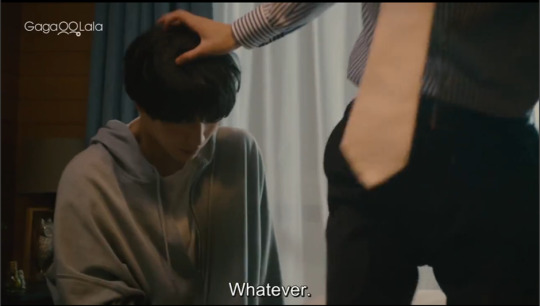
S: ふーん。あ、そ
S: Ohh..? I see.
ふーん (Ohh..?) - Segasaki says this a lot, especially in this episode. This is another one of those sounds that isn't a word but carries a lot of meaning. It has a dismissive sort of tone to it, like you've already assumed something or when you're pretty nonchalant/not impressed about whatever the other person has said and are just playing along with them by giving them some attention (so again, if you use it wrongly, it can piss people off). Segasaki uses it whenever Yoh goes mute or shy, as a way to tease Yoh - though Yoh seems to think Segasaki is dismissing/not interested in his answer.
あ、そ (A, so) - again, Segasaki says this a lot - can be interpreted as "oh really?/I see/is that so?" - Combined with the above, you can see why Yoh often thinks Segasaki isn't interested in his answer, and even when he does recognise it as teasing, he gets too flustered to do anything about it.
This seems to have gotten longer, if you reached the end - congratulations! I hope this makes it a little clearer why it's so obvious to us as the viewer that Segasaki is really quite patient with Yoh, and is waiting for him to come to terms with his feelings, but at the same time so confusing for Yoh, because of the way many of these interactions can be read both ways. In Ep 3, we'll really be able to get into their dynamics because they've got so much more interaction together.
#my personal weatherman#taikan yohou#体感予報#MPW subtitle corrections#mytranslations#finally got it out#doing a breakdown of the argument was very fun#this is like the most indulgent t/n ever#i am indulging myself the same way segasaki indulges yoh#thanks to everyone for reading my indulgent notes#please geek out with me more#these two are so perfect for each other#sorry I wanted to get Ep 3 and the analysis out before Ep 4 but it's not happening
192 notes
·
View notes
Note
I made a tumblr account bc of your amazing posts about MPW! Never used the platform b4 but I love it, just wondering if you will continue to post about the last 2 episodes? You opened up a new world for someone like me who does not speak the language or have insight into the culture! U are really awesome! thank you for the hard work with the posts!
Hi Anon welcome to tumblr and thank you!! Glad you've enjoyed them!! 😁😁
Yes I will finish the last 2 episodes for sure, as well as at least 2 more analysis posts (part 3 and 4, as listed on the masterlist). I'm still very well stuck on MPW and am not going anywhere just yet 😆😆
Thank you for the encouragement!
(PS usually we change our DP because leaving it as the default...shape means you might sometimes get confused for a bot!)
#my personal weatherman#my answers#how long i take depends entirely on how lost i get in segasaki's voice#ep 7 is rather mm 'trying' that way#ep 8 too
12 notes
·
View notes